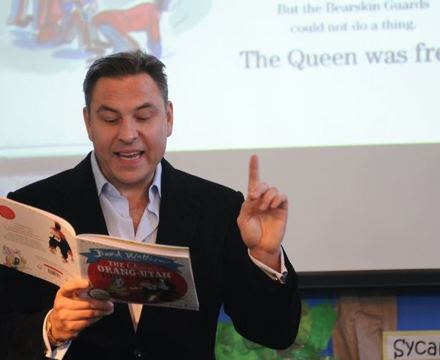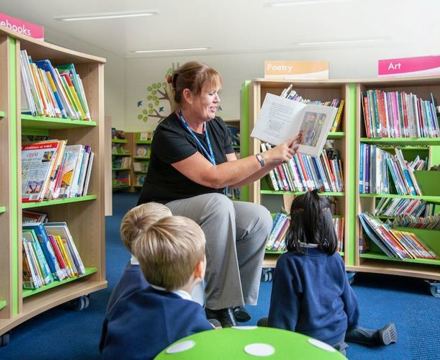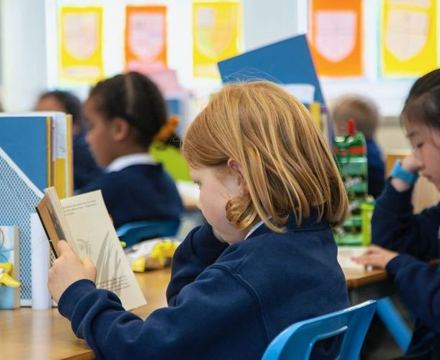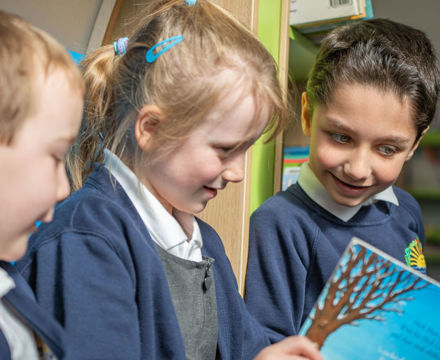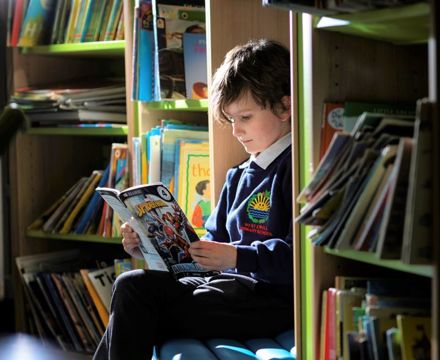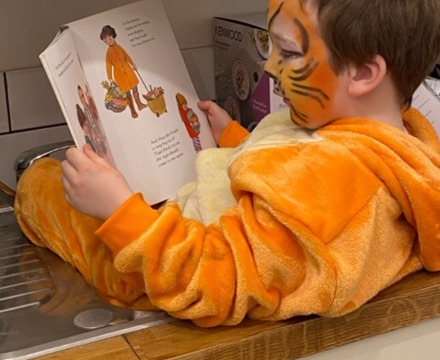Reading
We follow the National Curriculum:
Reading Intent
At West Ewell Primary School, we value reading as a crucial life skill. By the time children leave us, they read confidently for meaning and regularly enjoy reading for pleasure. Our readers are equipped with the tools to tackle unfamiliar vocabulary. We encourage our children to see themselves as readers for both pleasure and purpose.
Because we believe teaching every child to read is vital, we have a Reading Leader who drives the early reading programme in our school. This person is highly skilled at teaching phonics and reading, and they monitor and support our reading team, so everyone teaches with fidelity to the Little Wandle Letters and Sounds Revised programme. We also have a team of children known as Reading Ambassadors, who promote a love of reading across the school.
WEPS Reading Non-Negotiables Document
Reading Implementation
Teaching reading: Reading practice sessions two or three times a week
In Reception and Year 1 we teach children to read through reading practice sessions two (Reception) or three (Year 1) times a week. These:
- are taught by a fully trained adult to small groups of approximately six children
- use books matched to the children’s secure phonic knowledge using the Little Wandle Letters and Sounds Revised assessments and book matching grids
- are monitored by the class teacher, who rotates and works with each group on a regular basis.
Each reading practice session has a clear focus, so that the demands of the session do not overload the children’s working memory. The reading practice sessions have been designed to focus on three key reading skills:
- decoding
- prosody: teaching children to read with understanding and expression
- comprehension: teaching children to understand the text.
In Reception these sessions start in Week 4. Children who are not yet decoding have daily additional blending practice in small groups, so that they quickly learn to blend and can begin to read books.
In Year 2 and 3, we continue to teach reading in this way for any children who still need to practise reading with decodable books.
Whole Class Reading
Whole class reading begins in Year 2. Each session should focus on a specific reading skill linked to the reading prompts VIPERS (Vocabulary, Infer, Predict, Explain, Retrieve, Summarise). These skills should be pitched against the assessment statements for each year group and should be explicitly taught i.e. reinforcing the teaching points and steps to success to achieve this. Tasks will often be recorded in reading exercise books with a clear learning objective to help children identify and articulate the skill that they are focusing on.
Alongside the VIPERS skills, we also use a range of comprehension strategies to help build meaning:
- Using background knowledge
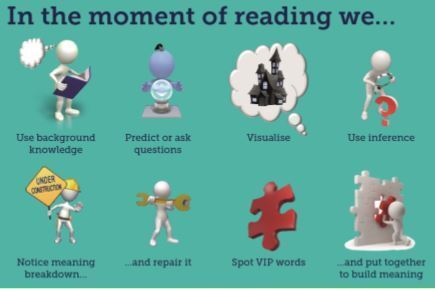
- Predicting or asking questions
- Visualising
- Using inference
- Noticing meaning breakdown... and repairing it
- Spotting VIP words
Our Whole Class Reading Overview
|
|
Autumn 1 |
Autumn 2 |
Spring 1 |
Spring 2 |
Sum 1 |
Sum 2 |
|---|---|---|---|---|---|---|
|
Year 2 |
The Smartest Giant in Town by Julia Donaldson |
Toby and the Great Fire of London by Margaret Nash and Jane Cope |
Superdad’s Day Off by Phil Earle and Steve May |
Counting on Katherine by Helaine Becker |
The Magic Finger by Roald Dahl |
The Monster Crisp-Guzzler by Malorie Blackman and Sami Sweeten |
|
Year 3 |
Varjak Paw by S.F Said |
Krindlekrax by Philip Ridley |
Oliver and the Seawigs by Philip Reeve |
|||
|
Year 4 |
Street Child by Berlie Doherty |
Beasts of Olympus by Lucy Coats |
Kensuke’s Kingdom by Michael Morpurgo |
|||
|
Year 5 |
Wonder by R J Pallacio |
Beowulf by Michael Morpurgo |
Coming to England by Floella Benjamin |
|||
|
Year 6 |
Letters from the Lighthouse by Emma Carroll |
Pig Heart Boy by Malorie Blackman |
The Explorer by Katherine Rundell |
|||
Our Whole School Reading Progression Map
Home Reading
In Reception and Year 1, decodable reading practice books are taken home to ensure success is shared with the family. Reading for pleasure books also go home for parents to share and read to children. We use the Little Wandle Letters and Sounds Revised parents’ resources to engage our families and share information about phonics, the benefits of sharing books, how children learn to blend and other aspects of our provision, both online and through workshops.
In Years 2-6, children have access to a wide range of books as part of our Accelerated Reader programme. These are changed as frequently as needed. Children also make weekly visits to our school library to enhance reading for pleasure.
Our expectations are that children should read for at least ten minutes every day, and this should be recorded in children’s reading records/planners.
Children from Nursery/Reception onwards have a home reading record. The parent/carer records comments to share with the adults in school and staff will write in this on a regular basis to ensure communication between home and school.
As the children progress through the school, they are encouraged to write their own comments and keep a list of the books/authors that they have read.
Accelerated Reader
What is Accelerated Reader?
Accelerated Reader (AR) is a computer program that helps teachers to manage and monitor children’s independent reading practice. Each picks a book at his/her own level and reads it at his/her own pace. When finished, the child takes a short quiz on the computer - passing the quiz is an indication that the child has understood what has been read.
Most children begin using the Accelerated Reader programme in Year 2. All children begin by undertaking a baseline Star Reading test which gives their reading level/ZPD (Zone of Proximal Development). Children choose books within their ZPD and complete an online quiz within 48 hours of reading the book.
How can I help my child?
As with anything, performance improves with practise. According to Renaissance Learning’s research, children who read for at least 20 minutes a day with a 90% comprehension rate on AR quizzes see the greatest gains. Encourage your child to read at home, discuss books, ask questions about what they have read and visit your local library.
Visit AR Bookfinder at
to conduct a search of all available books with AR quizzes.
Below is a parent guide to Accelerated Reader:
Accelerated Reader - What Parents Need to Know
1:1 Reading
Reception and Year 1
In addition to reading practice sessions which take place 2 (Reception) or 3 (Year 1) times per week, children in Reception and Year 1 receive a 1:1 read once each half term. Children in the lowest 20% of the class should be heard every day. Children in Reception and Year 1 who are receiving additional phonics keep-up sessions read their reading practice book to an adult daily. During individual reading sessions, adults record pink comments to highlight what the child has done well and green comments to identify next steps. Comments are recorded in the child’s reading record and the class reading file.
Year 2
Children in Year 2 receive a 1:1 read at least twice per half term. Children in the lowest 20% of the class should be heard every day and these children will also have access to reading practise sessions using decodable reading books. During individual reading sessions, adults record pink comments to highlight what the child has done well and green comments to identify next steps. Comments are recorded in the child’s reading record and the class reading file.
Key Stage 2
Children in the lowest 20% of the class should be heard every day. All other children should be heard at least twice a half term. Comments are recorded in children’s planners and class reading files.
Reading for Pleasure
‘Reading for pleasure is the single most important indicator of a child’s success.’ (OECD 2002)
‘The will influences the skill and vice versa.’ (OECD 2010)
We value reading for pleasure highly and work hard as a school to grow our Reading for Pleasure pedagogy. Reading is prioritised and highly visible across our school. We have invested in a beautiful library which children are able to visit weekly to access a wide range of texts.
By sparking growing imaginations, stimulating critical thinking and helping to develop empathy, reading gives children the very skills they need to succeed at school, at work and in life. Helping children discover a love of reading is crucial.
At West Ewell Primary School we;
- place reading and books at the centre of the curriculum
- recognise that being able to read well is a key life skill for children, whatever their background
- believe that every child can learn to read with the right teaching and support
- acknowledge that not all children will have had the opportunity to develop a love of reading at home, so this has to be taught and encouraged at school – just like any other area of the curriculum
- build time for all children to read independently, read aloud and be read to during the school day
- develop a coherent whole-school strategy for promoting reading for pleasure
- spend money and time to support reading, including buying books and developing the school environment to support reading
- believe that every teacher should be an advocate for reading
- devote time to training staff so they are equipped to support children’s enjoyment of reading
- give reading a high profile across the school community
- have a newly designed, bright and colourful library
- have 'Secret Readers' who sign up for a slot to come and read to a class (parents, grandparents etc)
- read aloud to the children each day so they are exposed to high-quality vocabulary and a wide range of genres
- have invested in a wide range of diverse texts that can be used for individual, small group and whole-class reading
- hold regular workshops and information evenings about how we teach children to read
- recommend books to parents and carers to read at home with their children
- have strong links with the local library with classes making visits when possible
Reading to our Children
We read to children every day. We choose carefully as we want children to experience a wide range of books, including books that reflect the children at West Ewell Primary School and our local community as well as books that open windows into other worlds and cultures. Book talk and discussion is encouraged to develop the children’s understanding of the text.
Reading Areas
All classes should have access to an inviting reading area with interesting displays. These may include an interactive element where children can add recommendations/book reviews. These may be in classrooms or in the corridor between classes. In Nursery/Reception, children have access to the reading corner every day in their continuous provision time and the books are continually refreshed. Past and future topic books should be available to help promote the application of disciplinary literacy.
Where possible, reading corners will display books in a forward facing fashion, to allow children to be drawn in by enticing front covers, titles and authors.
Reading Ambassadors
We have a team of class Reading Ambassadors from across the school. Their role involves activities such as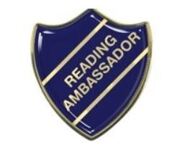 talking to their class about books they have read and enjoyed, helping others to pick a good book, keeping class book corners and reading books tidy, writing book reviews to share with others, helping to keep the library tidy and organised and, for the Year 6 Ambassadors, supporting at Story Time clubs after school.
talking to their class about books they have read and enjoyed, helping others to pick a good book, keeping class book corners and reading books tidy, writing book reviews to share with others, helping to keep the library tidy and organised and, for the Year 6 Ambassadors, supporting at Story Time clubs after school.
Reading Impact
Pupils will leave West Ewell Primary School as fluent and confident readers who can apply their knowledge and experience to a range of texts. They will be well prepared for the transition to their secondary school curriculum.
Pupils will be able to confidently decode unfamiliar words that they meet in age-appropriate books by the end of Key Stage One, following the in-depth teaching of systematic phonics from the Little Wandle Letters and Sounds Revised programme.
Pupils will access a range of texts for pleasure and enjoyment and use their skills to unlock learning across all areas of the curriculum.
Pupils will talk about their preferred authors and genres with confidence and enthusiasm.
Pupils of all abilities will be able to succeed in all reading lessons because work will be appropriately scaffolded.
Parents and carers will have a good understanding of how they can support reading at home, and contribute regularly to homework.
The % of pupils working at ARE within each year group will be at least in line with national averages.
The % of pupils working at Greater Depth within each year group will be at least in line with national averages.
There will be no significant gaps in the progress of different groups of pupils (e.g. disadvantaged vs non-disadvantaged).
Special Events
Children across the school have regular opportunities to engage with a wide range of Reading for Pleasure events (book fairs, author visits and workshops, World Book Day etc).
Phonics
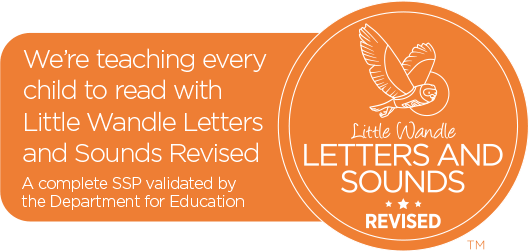
Phonics Intent
At West Ewell Primary School and Nursery, we believe that all our children can become fluent readers and writers. This is why we teach reading through Little Wandle Letters and Sounds Revised, which is a systematic and synthetic phonics programme. We start teaching phonics in Reception and follow the Little Wandle Letters and Sounds Revised progression, which ensures children build on their growing knowledge of the alphabetic code, mastering phonics to read and spell as they move through school. Children in Nursery are introduced to the images used in the Little Wandle programme and are given opportunities to practise oral blending so that they are ready to begin formal phonics teaching in Reception.
As a result, all our children are able to tackle any unfamiliar words as they read. We also model the application of the alphabetic code through phonics in shared reading and writing, both inside and outside of the phonics lesson and across the curriculum. We have a strong focus on language development for our children because we know that speaking and listening are crucial skills for reading and writing in all subjects.
Phonics Implementation
Phonics is part of our continuous nursery provision and is delivered daily using discrete lessons in Reception and Year 1. From Year 2, children continue to revise their phonic knowledge and begin following our spelling programme of study. Children undertake the statutory phonics screening check in the summer of Year 1. Those who do not reach the expected standard then retake in Year 2. Group and 1:1 keep up sessions are provided for children who need additional support.
From the spring term in Year 2 onwards, children are given regular Rapid Catch-Up sessions, following the Little Wandle Letters and Sounds programme to help close gaps and accelerate progress.
|
Year Group |
Autumn Term |
Spring Term |
Summer Term |
|---|---|---|---|
|
Nursery |
Phase 1 |
Phase 1 |
Phase 1 |
|
Reception |
Phase 2 |
Phase 3 |
Phase 4 |
|
Year 1 |
Revision of phase 3 & 4 Phase 5 |
Phase 5
|
Phase 5 Phonics Screening Check |
|
Year 2 |
Revision of Phase 3/5 Y2 spelling rules/common exception words Group and 1:1 intervention for children who did not pass the Y1 phonics screening check. Rapid Catch-Up sessions following the Letters and Sounds programme for children who are not reading at age-related expectations. |
||
|
Year 3 onwards |
Group and 1:1 intervention for children who did not pass Y2 phonics screening retake. Rapid Catch-Up sessions following the Letters and Sounds programme for children who are not reading at age-related expectations. |
||
Foundations for Phonics in Nursery
We provide a balance of child-led and adult-led experiences for all children that meet the curriculum expectations for ‘Communication and language’ and ‘Literacy’. These include:
- sharing high-quality stories and poems
- learning a range of nursery rhymes and action rhymes
- activities that develop focused listening and attention, including oral blending
- attention to high-quality language.
We ensure Nursery children are well prepared to begin learning grapheme-phoneme correspondences (GPCs) and blending in Reception.
Daily phonics lessons in Reception and Year 1
We teach phonics for up to 30 minutes a day. In Reception, we build from 10 minute lessons, with additional daily oral blending games, to the full-length lesson as quickly as possible. Each Friday, we review the week’s teaching to help children become fluent readers.
Children make a strong start in Reception: teaching begins in Week 2 of the Autumn term.
We follow the Little Wandle Letters and Sounds Revised expectations of progress:
- Children in Reception are taught to read and spell words using Phase 2 and 3 GPCs, and words with adjacent consonants (Phase 4) with fluency and accuracy.
- Children in Year 1 review Phase 3 and 4 and are taught to read and spell words using Phase 5 GPCs with fluency and accuracy.
Daily keep-up lessons ensure every child learns to read
- Any child who needs additional practice has daily keep-up support, taught by a fully trained adult. Keep-up lessons match the structure of class teaching, and use the same procedures, resources and mantras, but in smaller steps with more repetition, so that every child secures their learning.
- We timetable daily phonics or Rapid Catch-Up lessons for any child in Year 2, 3 or beyond who is not fully fluent at reading or has not passed the Phonics Screening Check. These children urgently need to catch up, so the gap between themselves and their peers does not widen. We use the Little Wandle Letters and Sounds Revised assessments to identify the gaps in their phonic knowledge and teach to these using the Little Wandle Rapid Catch-Up programme.
Phonics Impact
Assessment in Phonics
Assessment is used to monitor progress and to identify any child needing additional support as soon as they need it.
Assessment for learning is used:
- daily within class to identify children needing keep-up support
- weekly in the review lesson to assess gaps, address these immediately and secure fluency of GPCs, words and spellings.
Summative assessment is used:
- every six weeks to assess progress, to identify gaps in learning that need to be addressed, to identify any children needing additional support and to plan the keep-up support that they need. This is recorded on Phonics Tracker.
- by SLT and scrutinised through Phonics Tracker, to narrow attainment gaps between different groups of children so that any additional support for teachers can be put into place.
Statutory Assessment
Children in Year 1 sit the Phonics Screening Check. Any child not passing the check re-sits it in Year 2. A phonics screening rehearsal is carried out mid-year, individually outside the classroom and feedback on what to practise is given to parents via the reading record book. In April an information meeting for parents is held about the Phonics Screening Check so they know what to expect and how best to support at home.
Ongoing assessment for catch-up
Children in Year 2 to 6 are assessed through their teacher’s ongoing formative assessment as well as through the half-termly Little Wandle Letters and Sounds Revised summative assessments.
Phonics Screening Check Information Slides
WEPS Reading Programme of Study


